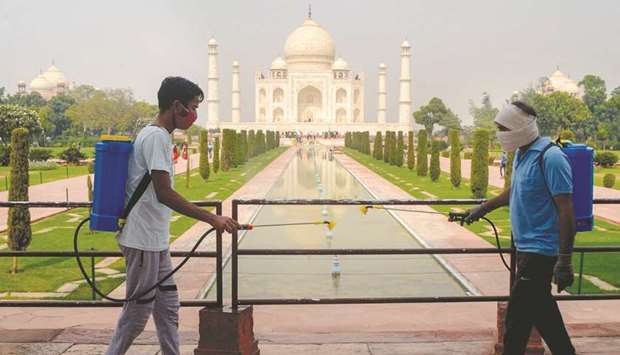The coronavirus pandemic seems to have peaked in India, a government-appointed committee said yesterday.
The panel -which has members of the Indian Council of Medical Research and Indian Institutes of Technology - also said if safety measures are properly followed, Covid-19 can be brought under control by “early next year, with minimal active cases by February end.”
From a peak of over 97,000 cases, India is now logging 60,000-plus cases a day.
India’s coronavirus infections rose by another 61,871 over the past 24 hours, data released yesterday showed, although the Health Ministry said it is seeing a trend of steadily declining active cases.
The number of active cases remained below 800,000 for the second consecutive day.
The committee, headed by Professor M Vidyasagar of IIT Hyderabad, has used computer models to map the trajectory of the epidemic in the country.
Its key finding has been that the disease is likely to have peaked in the middle of September, and the total number of infections in the country is unlikely to exceed 10.6mn, NDTV network and Indian Express newspaper reported.
The committee claimed that a strict lockdown imposed in March has had a powerful impact on slowing the spread of the disease in the country.
However, further lockdowns are “undesirable”, the committee recommended since they are unlikely to have any significant impact.
The committee has said the upcoming festival season, and the approaching winters, might “increase the susceptibility” of the people to this infection, and therefore, has recommended that current protective measures be continued.
Based on temporal profiles of analyses done for Bihar and Uttar Pradesh, the committee concluded that the impact of labour migration on the total number of infections in these states was minimal.
“India has one-sixth of the world’s population, and one-sixth of the reported cases. However, India accounts for only 10% of the world’s deaths, and its case fatality rate of less than 2% is among the lowest in the world,” the committee said.
It recommended that the existing personal safety protocols need to continue in full measure, otherwise the country will see a sharp rise in infections.
“Avoiding congestion especially in closed spaces and special care of those above 65 years and children is even more significant. Personnel with co-morbidities need to be extra cautious,” it said.
The Department of Science and Technology in June set up the committee comprising eminent scientists and academics to evolve a national supermodel for Covid-19 progression.
The mandate of the committee was to create an evidence-based mathematical model for the pandemic after taking inputs from various groups working in the domain in the country and use it to analyse past events and future trajectories of the pandemic.
Meanwhile, federal Health Minister Harsh Vardhan attributed the worsening Covid-19 situation in Kerala to the state government’s “gross negligence” during the recent Onam festivities.

Workers sanitise the premises of Taj Mahal as a preventative measure against the Covid-19 in Agra yesterday.
